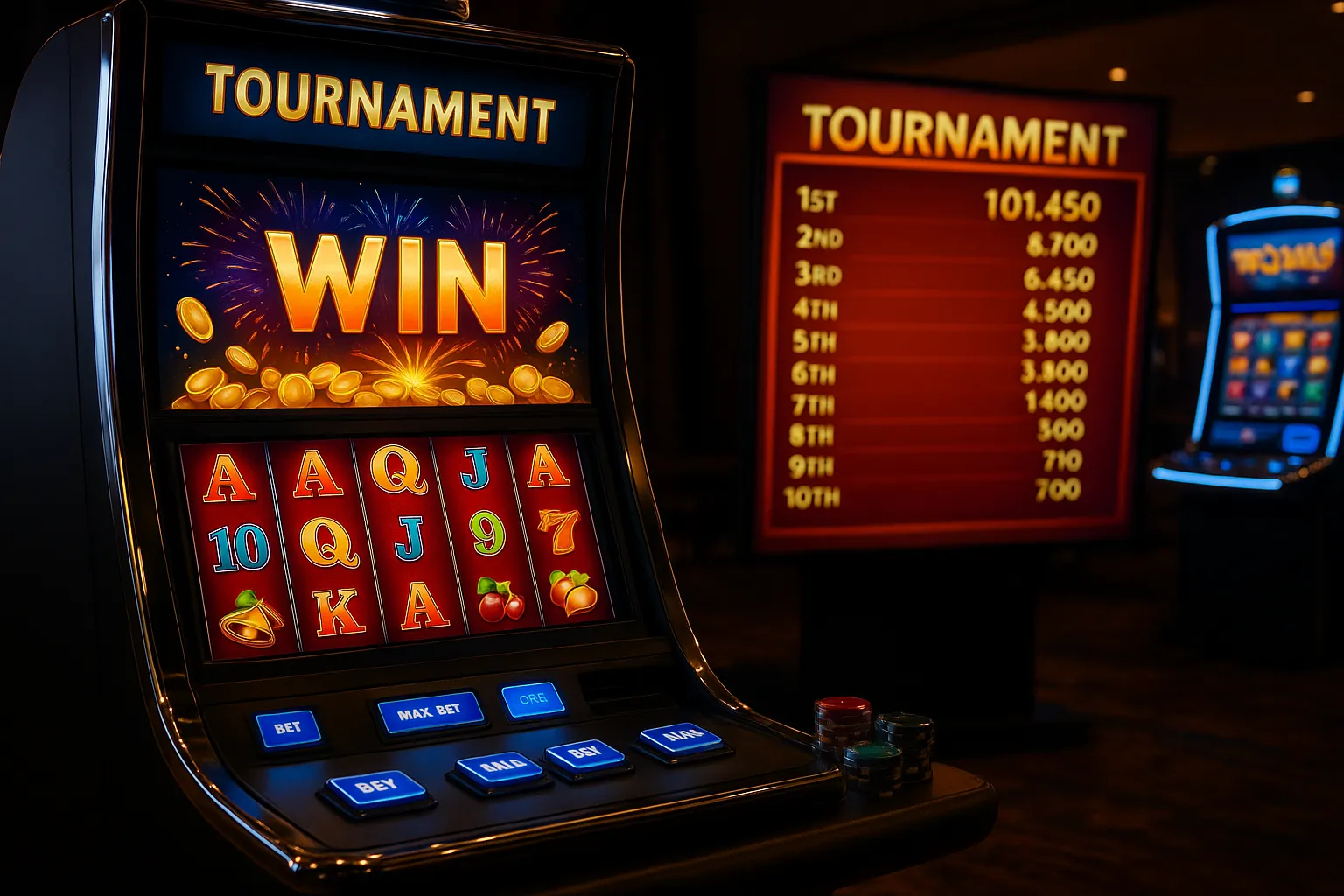Slot tournaments look like pure adrenaline: countdown clocks, leaderboards ticking in real time, and a room (or lobby) full of players hammering spin simultaneously. I’ve jumped into more than a few—both in brick-and-mortar casinos and online—and I’ve learned that the answer to whether they offer “better odds” hinges on how you define value. Is it purely about EV (expected value), or are you chasing entertainment, social buzz, and a shot at overlayed prize pools?
How Slot Tournaments Actually Work
Instead of you versus the RNG alone, tournaments pit you against other players over a set window—maybe 5 minutes, maybe an hour, sometimes a full day. Everyone usually gets the same number of credits or time. Your mission: convert those credits into as many points as possible by landing wins, hitting bonus rounds, or triggering multipliers. Prizes go to the top slice of the leaderboard. The math changes because you’re no longer just “hoping for a win”; you’re hoping for a bigger win than everyone else within a fixed budget.
Most casual players overlook a crucial reality: if the entry fee (or buy-in) is modest but the prize pool is guaranteed and undersubscribed, you’re getting positive overlay—free EV that the casino is essentially giving away to fill seats. This is where tournaments can outshine regular spinning. When the pool is stuffed, though, your slice shrinks fast, and the “value” becomes mostly entertainment.
The Psychology and Pace of Tournament Play
Tournaments compress emotion. The timer adds pressure, the leaderboard adds FOMO, and you can’t pause to rethink your strategy. This pace is thrilling if you like speed and structure, but it can tilt you quickly. I’ve watched players blow through credits in a frenzy, only to realize later that slow, steady spacing of spins might have served them better. Others go the opposite way—too cautious, and they miss the volume needed to hit that one spike win that rockets you upward.
One practical note I share with friends: when you’re choosing a platform for tournaments, make sure it’s one of the best betting sites with fast withdrawal. If you hit a top prize, instant access matters. Long pending periods, capped weekly withdrawals, or convoluted KYC demands can turn a sweet victory into a sour aftertaste. Fast payout casinos—especially those with multiple e-wallets and crypto options—let you lock in profits quickly and move on.
Are the Odds “Better” Than Regular Slots?
Tournament odds are relative. In a standard slot session, your result is independent; it rises and falls only on RNG and your bet size. In a tournament, everyone plays the same RNG in principle, but the distribution of luck during the window defines the winners. If you’re up against sharks who specialize in tourneys, your odds drop. If you’re in a casual crowd or a lightly populated bracket, your edge rises. The house edge on the underlying slot doesn’t vanish, but the prize pool structure can shift EV in your favor—if conditions are right.
Consider this scenario: a £10 buy-in tournament with £2,000 guaranteed and only 120 entrants. Even after rake, that’s a positive overlay. Conversely, a £20 buy-in with 1,000 players chasing £10,000 is likely negative EV unless you’re consistently finishing top 3%.
Time, Not Money, Becomes Your Resource
In fixed-time tournaments, every second counts. Hammering the spin button relentlessly might seem optimal, but if the slot you’re assigned has high volatility, you may benefit from a rhythm that lets animations finish (some games don’t credit unfinished wins until the spin fully resolves). On the other hand, fixed-credit formats reward speed because unused credits have zero value at the buzzer. Know the rules: does pausing cost you? Do bonus rounds chew time? Are auto-spins allowed? Good tournament players study these quirks like poker players study blinds.
Volatility Choice: Feast or Consistency?
When you can choose the game (some tourneys let you pick among a pool), volatility becomes a weapon. High-volatility slots rarely pay, but when they do, they can throw you straight to the top. Low-volatility titles drip steady small wins, which might secure mid-tier prizes but won’t catch a runaway leader. I prefer mid-high volatility and accept the risk. If the prize distribution pays deep (e.g., top 50% get something), a low-volatility grind can lock a min-cash. If only the top 10 spots pay, swing for the fences.
Bankroll Strategy: The Hidden Cost of “Rebuys”
Many online tournaments allow rebuys or add-ons. This changes everything. Without them, everyone’s on equal footing. With them, whales can brute-force their way up the standings. Track your total spend, not just your initial entry. I set a rule: never rebuy more than the initial entry unless overlay is massive and the field soft. Rebuys can morph a fun $10 tourney into a stealth $100 session before you notice.
Leaderboard Dynamics and Late Registration
Late registration can be friend or foe. Jumping in late on a small field may reveal the scores you need to beat, letting you gauge the required aggression. But you’ll have less time to run up points. Conversely, early entry gives you the full window but no reference scores. When possible, I peek at leaderboards—if the top scores look modest, I may play safer; if someone is miles ahead, it’s time to embrace volatility.
Live vs. Online Tournaments: Atmosphere vs. Analytics
Live casino tourneys are a vibe: noise, celebration, camaraderie. They can also be distracting. Online, you get analytics, chat rooms, and sometimes hand histories of top players’ sessions. I treat online like a sport—watch, learn, adapt. Live is for the social buzz and that “event feel.” EV can exist in both, but I’ve personally found more overlay online simply because small sites run promos that don’t always fill.
Mindset: Emotional Bankroll Still Rules
Tournaments compress swings into minutes. If a bad streak tilts you, it’s amplified. Remember, the house edge is baked into the slot no matter what. The tournament just redistributes player losses into a prize pool. Manage expectations: most entrants will lose their fee or min-cash. Celebrate good placements, but don’t let a near-miss drag you into rebuys or the next tourney impulsively.
Practical Checklist Before You Register
-
Understand the format: time-based or credit-based? Rebuys allowed? Prize distribution flat or top-heavy?
-
Check site reliability: fast withdrawals, transparent terms, responsive support.
-
Scout the field size: overlay or overcrowded?
-
Know the assigned game’s volatility and bonus mechanics.
-
Set a hard spend cap (entry + max rebuys) and a tilt breaker (walk away if you bust early).
-
Track results. Over a few months, you’ll see if tourneys fit your style or just drain your roll.
So…Better Odds or Just Different Ones?
Tournament slots don’t magically change the RTP of the game. What they do is change the way returns are distributed among players. If you can sniff out soft fields, overlayed prize pools, or formats that favor your play style, they can give you better effective odds than solo spinning. If you jump in blindly and chase leaderboards without a plan, you’re probably just paying extra for the thrill.
My own benchmark is simple: If I can find a tourney where the total payout divided by entrants gives me a theoretical positive return (after factoring in realistic placement probabilities), I’m in. Otherwise, I’ll treat it as a fun diversion, not a primary grind.








